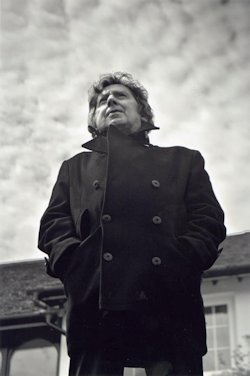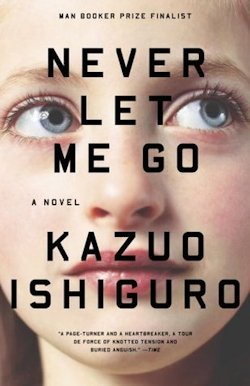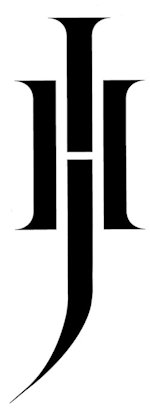Welcome back to the British Genre Fiction Focus, Tor.com’s regular round-up of book news from the United Kingdom’s thriving speculative fiction industry.
Today, we begin with news of a new annual award for horror novels in honour of the late, great James Herbert, who passed away last March.
This week also saw the announcement of a brand new book by Kazuo Ishiguro. The Buried Giant will be his first full-length fiction since Never Let Me Go almost a decade ago.
Also figuring into this edition: the ghost of Kurt Cobain, Christopher Priest’s plans, talk of Tigerman by Nick Harkaway, a couple of new covers and the launch of an eclectic assortment of novels based on a new game by David Braben.
There’s all that and much more to come, of course.
Awards Watch: Herbert for Horror
When James Herbert passed away last March, I noted in the Focus released that week that there was “no getting around the impact he had on the horror genre.”
Well it’s my pleasure to tell you that his influence will continue. On Monday morning, his publisher Pan Macmillan made public its plans to award an annual prize in his honour:
To celebrate the life and career of one of the world’s best and most loved horror writers, Pan Macmillan and the estate of James Herbert are pleased to announce The James Herbert Award for Horror Writing.
The prize, which will be awarded annually, aims to discover and publicise a new generation of horror authors working today and celebrate the boldest and most exciting talent in the genre. The winning author will receive a specially-designed commemorative statuette and a cheque for £2000.

Accompanying the announcement were comments from Herbert’s long-time editor and publisher, and the author’s wife Eileen:
Jeremy Trevathan […] said: “Whenever a giant in their field passes away it’s up to those left behind to find an appropriate way to mark the memory. I’m so pleased that we will be remembering Jim in this way and I hope he would be happy and proud.”
Herbert’s wife [had this to add]: “I was thrilled when Jeremy talked to me about this award. Throughout his years as a storyteller Jim encouraged new and upcoming writers and I know he would be delighted and honoured that his name will continue this tradition.”
It really is something, isn’t it? And the prize is in good hands too:
The first year of the award will be overseen in partnership with the Serendip Foundation, the administrative organisation behind the Arthur C. Clarke Award.
Serendip director Tom Hunter said: “Being asked to be involved with the inaugural James Herbert Award is a huge honour for Serendip and a personal pleasure for me as a long-time fan of James Herbert’s work. Serendip’s mission has always been to promote great books, and we welcome the opportunity to help launch a major new award in this way.”
The inaugural award will be open to horror novels written in English and published in the UK between 1st January 2014 and 31st December 2014. Self-published novels won’t be eligible, however—an oddly old-fashioned holdover, no?
I could already reel off a selection of potential contenders, including Alison Littlewood for The Unquiet House and Steve Rasnic Tem for Blood Kin. From these, not to mention the many books that remain to be released—including but not limited to Stephen King’s Revival, Adam Nevill’s next novel No One Gets Out Alive, The Voices by F. R. Tallis and the Southern Reach series by Jeff VanderMeer—from these, then, a shortlist of five works of fiction will be announced in next January, with the winner ultimately unveiled at an awards ceremony in March 2015.
But I’m quite sure we’ll talk about The James Herbert Award for Horror Writing again before then.
New Ishiguro Too
With new novels by Peter Carey and Ian McEwan revealed in recent weeks, there’s been a bunch of big literary fiction news lately. But this? This is the biggest.

On Friday, Faber & Faber named Kazuo Ishiguro’s new novel—his first, in fact, since the publication of Never Let Me Go a decade ago, so you’d be forgiven for having forgotten about one of Great Britain’s best and brightest writers. This article in The Guardian will help you remember:
Ishiguro won the Booker prize in 1989 for The Remains of the Day, set between the wars in the English mansion Darlington Hall, and narrated by the ageing butler Stevens. The writer, who was born in Japan but came to Britain at the age of five, is also the author of A Pale View of Hills, published in 1982, An Artist of the Floating World, The Unconsoled and When We Were Orphans. Nocturnes, a collection of short stories, was published in 2009.
He has been shortlisted for the Booker four times, and has also been given an OBE for Services to Literature, as well as the prestigious French decoration of Chevalier de L’Ordre des Arts et des Lettres.
Though actual details about Ishiguro’s new novel are still thin on the ground, publisher Stephen Page said that “The Buried Giant is a truly sublime new chapter in one of the most significant bodies of work of anyone writing today. It is as surprising, moving and brilliant as you could hope for, and we can’t wait to publish.”
The Buried Giant has been described, in the erstwhile, as being about “lost memories, love, revenge and war,” which pitch we can pair with something Ishiguro said in an interview with The Paris Review in 2008:
“I’d wanted for some time to write a novel about how societies remember and forget. I’d written about how individuals come to terms with uncomfortable memories. It occurred to me that the way an individual remembers and forgets is quite different to the way a society does. When is it better to just forget?
“This comes up over and over again. France after the Second World War is an interesting case. You could argue that De Gaulle was right to say, ‘We need to get the country working again. Let’s not worry too much about who collaborated and who didn’t. Let’s leave all this soul-searching to another time.’ But some would say that justice was ill served by that, that it leads eventually to bigger problems.”
Problems I full well expect Ishiguro to explore in The Buried Giant when it’s released in March 2015.
Odds and Sods
-
 The Sunday Times Short Story Prize has been awarded to the winner of the last Pulitzer Prize for Fiction, Adam Johnson, for a “mind-expanding” speculative story named ‘Nirvana,’ which features the ghost of Kurt Cobain and takes place in “a bleak near future of hovering drones and voice-activated beds after the assassination of an American president.”
The Sunday Times Short Story Prize has been awarded to the winner of the last Pulitzer Prize for Fiction, Adam Johnson, for a “mind-expanding” speculative story named ‘Nirvana,’ which features the ghost of Kurt Cobain and takes place in “a bleak near future of hovering drones and voice-activated beds after the assassination of an American president.”
- In an interview with Titan Books conducted to tie in with the belated North American launch of his latest, The Adjacent, Christopher Priest let slip a little about what he’s been working on in the interim, including “a new novel, provisionally called The Section [and] another novel which I’ve put aside for the time being, called The Late (working title).” He also has plans “for an amazing work of non-fiction which I’ll be working on after I’ve delivered one of these novels.” What a lot to look forward to!
- Two of Neil Gaiman’s novels have new cover looks.
- The First Fifteen Lives of Harry August by Claire North is an extraordinary novel, so it’s fitting that Orbit has gone above and beyond to make the experience of reading it equally unique: one of a kind, hand-written postcards will come with every copy, including several very special messages.
- Gollancz has bought the rights to release “a remarkable SF debut” by BSFA Award shortlisted author Al Robertson. Crashing Heaven “follows a unique friendship and ultimately asks what it means to be human in our technologically advancing world. Crackling with energy and wit, it will appeal to fans of everything from detective noir to genre classics like Neuromancer.” Look for it in June 2015.
- Meanwhile, in mid-May, Gollancz will release three Elite ebooks ahead of the launch of the Kickstarted David Braben game, namely Nemorensis by Simon Spurrier, Docking is Difficult by Gideon Dafoe, and Wanted, a collaboration between Gavin Smith and Stephen Deas. Physical editions of the novels will follow alongside the release of Elite: Dangerous later in the year.
- Angry Robot Books has revealed the Alejandro Colucci cover for The Guild of Assassins by Anna Kashini, which is to say the sequel to Blades of the Old Empire.
- In the course of talking up Tigerman, Nick Harkaway realised that he hates ARCs. “I don’t really understand why anyone sends out proofs. It seems, now that I look at it, like an expensive and self-defeating madness.” Without which, I have to add, any number of new books simply wouldn’t be reviewed.
Niall Alexander is an extra-curricular English teacher who reads and writes about all things weird and wonderful for The Speculative Scotsman, Strange Horizons, and Tor.com. He’s been known to tweet, twoo.










